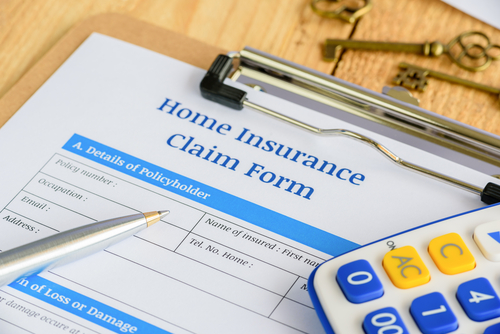It’s hard to predict when a natural disaster may occur in a specific area. However, it’s best to stay prepared with the right resources and procedures if it does happen. As such, whether you’re a tenant or a rental owner, it’s crucial to stay prepared for several emergency situations that may arise. Read along as we go over how to prepare for a natural disaster and what to do if one occurs near your property.
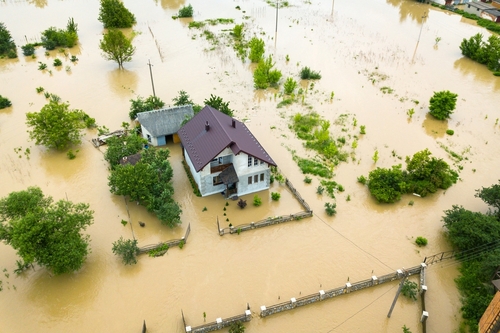
Contents of This Article:
- What Is a Natural Disaster?
- How to Prepare for a Natural Disaster
- What to Do After a Natural Disaster Hits Your Property
- Add Another Layer of Protection With Property Management
What Is a Natural Disaster?
A natural disaster is a severe weather event that has the potential to threaten or harm a community. Depending on the type of disaster, it can be life-threatening and damaging to properties and critical infrastructure. Some of the main types of natural disasters include the following:
- Wildfires– Fires can be caused by several human or natural occurrences, like cooking, chemicals, fireworks, and lightning. A wildfire spreads quickly and intensely, destroying everything in its path.
- Hurricanes– Hurricane season generally last from June through November, affecting some areas more than others. Fortunately, hurricanes are more predictable than other natural disasters, giving you a little extra time to prepare.
- Tornadoes– Tornadoes can happen anytime with little to no warning signs. Peak tornado season is usually March through May, and some states have them throughout the early summer.
- Earthquake– Earthquakes are one of the most unpredictable and damaging natural disasters. As such, acting quickly to protect yourself during an earthquake is crucial.
- Flood– Flooding is quite common and can happen year-round, whether it’s large amounts of snow melting or a severe thunderstorm. Raising your furniture and appliances can help minimize damage.
- Winter Storm– Major snow storms can stop transportation and close down schools, offices, and even entire towns. Staying indoors and planning for power outages can help minimize safety risks.
While each scenario vastly differs, staying prepared for anything is important. Additionally, preparing is even more crucial if you live in an area prone to any of the above natural disasters.
How to Prepare for a Natural Disaster
While you can’t stop or prevent natural disasters, you can prepare for them. Staying ready for a catastrophic event before it happens can protect you, your family, and your home. Depending on your location, you could be more prone to natural disasters than other areas. As such, if you want to stay prepared, follow these helpful tips.
Have a Disaster Plan
One of the best ways to ensure safety and prepare yourself for a natural disaster is with a solid plan. First, you’ll want to sign up for emergency alerts in your area to inform you of any warnings or updates on what’s happening near you. That way, you have as much time as possible to implement your plan.
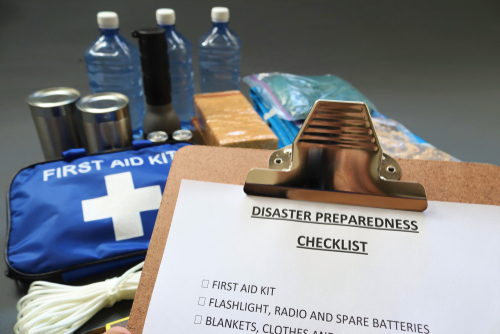
If you’re not sure how to create a preparedness plan, there are several resources available to get you started on the right path. That said, your plan may differ depending on the natural disaster you’re preparing for. For instance, you might devise an evacuation route if you’re preparing for a wildfire, tsunami, or hurricane. However, finding underground shelter is crucial if you’re preparing for a tornado or earthquake.
Take Proper Precautions
The first step in preparing for a natural disaster is ensuring your and your family’s safety. Next, however, you’ll want to consider the security of your home or apartment. While it’s not practical or necessary to make physical changes to your home to prepare for a disaster, there are some small actions steps you can take to ensure safety.
For instance, if you live in an area prone to wildfires, try to keep flammable materials away from the property and trim nearby trees. If you live in a rental property, you can ask your landlord or property manager to use these precautions if they’re not already in place.
Additionally, if you’re preparing your home for a hurricane or flood, you’ll want to check for existing leaks, clean gutters, install shutters, and secure loose objects that may be affected by strong winds. You might also consider raising your furniture and appliances off the floor to protect them. Of course, your precautionary measures will ultimately depend on which severe weather you’re planning for.
Keep Insurance Updated
Whether you’re a homeowner or renter, it’s essential to have insurance–and a policy with the coverage you need.
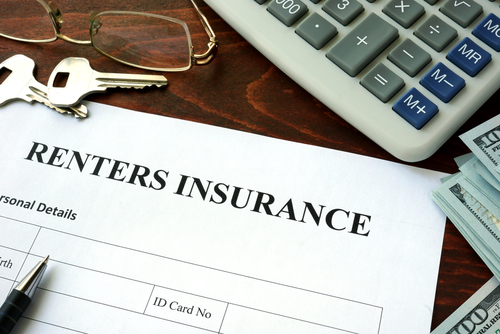
For example, if you’re a tenant living in an area prone to severe weather, you’ll want a good renters insurance policy. That said, not all policies cover certain weather damages, so it’s important to look for a policy with the coverage you need or add it if necessary.
If you’re a rental owner, you must know what types of losses you could face. For instance, depending on the severity of the natural disaster, you could face significant property damage or even lose your property altogether. Additionally, you’ll want to account for lost income due to an inhabitable property or tenant liability claims.
What to Do After a Natural Disaster Hits Your Property
If you own rental properties, you know the importance of keeping tenants informed and prepared for the worst. However, you can’t prevent a natural disaster, and depending on the event, you could face property damage.
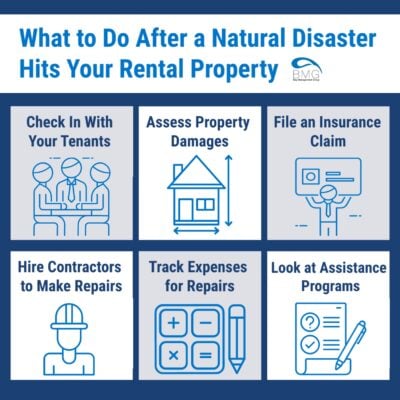
If you do, here are some of the next steps you should take to ensure tenant safety and protect your property afterward.
- Check In With Your Tenants
- Assess Property Damages
- File a Home Insurance Claim
- Make Temporary Repairs and Hire a Contractor
- Track Expenses for Repairs
- Ask For Help If You Need It
Check In With Your Tenants
During uncertain or catastrophic times, it can be difficult to think clearly. However, your first course of action should be checking in with your tenants to ensure they’re safe and okay. Keeping an open line of communication during times of crisis can ensure your tenants feel cared for while staying in your rental. As such, communicate with them to ensure they’ve evacuated if necessary, and guide them on what to do next if they’re unsure.
Assess Property Damages
Once the storm or natural disaster has settled and you’ve ensured your tenants are safe, you’ll want to examine any property damage. Taking photos and documenting property damage immediately is crucial during this time. So, you’ll want to take multiple images from different angles to get all the details of each damaged area. Your insurance company may also send someone to inspect the property so that repairs can be determined.
File a Home Insurance Claim
If you have property damage from a natural disaster, you’ll want to file a homeowners insurance claim immediately. You’ll also want to file a claim if you’re a renter and your personal property was damaged in a natural disaster. Since there’ll likely be a lot of claims coming in from other damaged properties, it’s important to file right away. When filing your claim, submit photos and documentation to show the extent of property damages.
Make Temporary Repairs and Hire a Contractor
Depending on the severity of property damage, you may want to make temporary repairs or secure the premises to avoid further damage. For instance, if you have large holes in the roof, you can avoid water damage by covering the area with a tarp. Once you’ve secured the property well enough, you’ll want to get quotes from a few contractors for any necessary repairs. Again, it’s crucial to find a reputable, licensed contractor with good reviews and extensive experience.
Track Expenses for Repairs
Whenever you handle emergency repairs or hire contractors to perform work, keep all receipts and invoices you receive. Keep them in a safe place until your insurer needs them. That way, you have records of all the work done on your property and which damages required the most attention. Then, when you meet with your insurer, you can easily show them the documentation and discuss available insurance coverage.
Ask For Help If You Need It
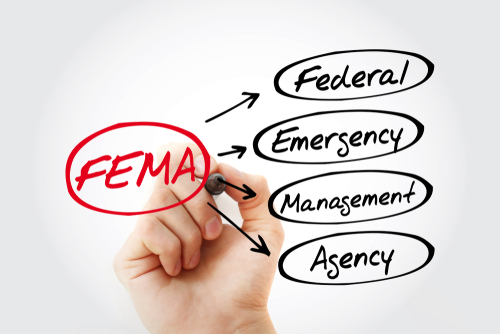
Natural disasters are usually unexpected and very detrimental to homes, people, and communities. As such, many government organizations, like the Federal Emergency Management Agency (FEMA), supports citizens and emergency personnel in navigating, preparing, and responding to hazards.
Additionally, they’ll let you know if you qualify for any type of aid, such as grants to cover some expenses, lodging expenses for displaced tenants, and other helpful resources. Tenants can also benefit from FEMA grants, so if your tenants experienced property damage, inform them of available resources.
Add Another Layer of Protection With Property Management
Some things are out of human control, like natural disasters. However, adapting and knowing what to do after a natural disaster is essential. While everyone’s top priority should be keeping themselves safe, tenants and rental owners should know what to do if a disaster hits a rental property.
With trusted property management, you can be confident that your tenants are getting the necessary information to care for your rental. Bay Property Management Group offers full-service management for rentals near Baltimore, Philadelphia, Northern Virginia, and Washington, DC. Need help managing your rental property? Contact BMG today!

